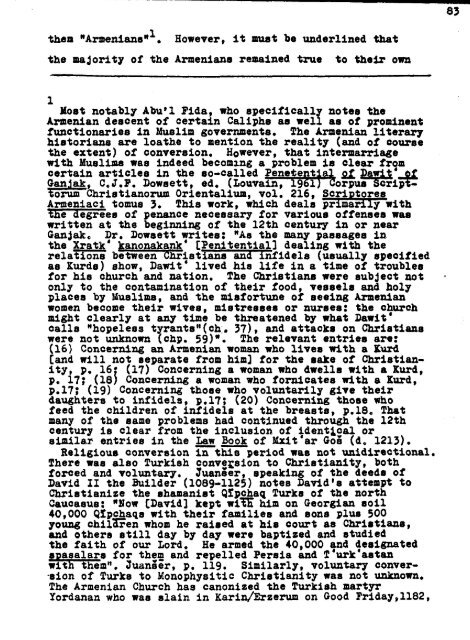The Turco-Mongol Invasions and the Lords of Armenia in the 13 ...
The Turco-Mongol Invasions and the Lords of Armenia in the 13 ...
The Turco-Mongol Invasions and the Lords of Armenia in the 13 ...
Create successful ePaper yourself
Turn your PDF publications into a flip-book with our unique Google optimized e-Paper software.
<strong>the</strong>m "<strong>Armenia</strong>ns" .<br />
However,<br />
it must he underl<strong>in</strong>ed that<br />
<strong>the</strong> majority <strong>of</strong> <strong>the</strong> <strong>Armenia</strong>ns rema<strong>in</strong>ed true to <strong>the</strong>ir own<br />
1<br />
Most notably Abu'l Pida, who specifically notes <strong>the</strong><br />
<strong>Armenia</strong>n descent <strong>of</strong> certa<strong>in</strong> Caliphs as well as <strong>of</strong> prom<strong>in</strong>ent<br />
functionaries <strong>in</strong> Muslim governments. <strong>The</strong> <strong>Armenia</strong>n literary<br />
historians are loa<strong>the</strong> to mention <strong>the</strong> reality (<strong>and</strong> <strong>of</strong> course<br />
<strong>the</strong> extent) <strong>of</strong> conversion. However, that <strong>in</strong>termarriage<br />
with Muslims was <strong>in</strong>deed becom<strong>in</strong>g a problem is clear from<br />
certa<strong>in</strong> articles <strong>in</strong> <strong>the</strong> so-called Penetentlal <strong>of</strong> Pawit *<br />
<strong>of</strong><br />
Ganjaf<br />
c, C.J.P. Dowsett, ed. (Louva<strong>in</strong>, 1961} Corpus Scripv-<br />
torum Christianorum Orlentalium, vol. 216, Seriptores<br />
<strong>Armenia</strong>cl tomus 3. This work, which deals primarily with<br />
<strong>the</strong> degrees <strong>of</strong> penance necessary for various <strong>of</strong>fenses was<br />
written at <strong>the</strong> beg<strong>in</strong>n<strong>in</strong>g <strong>of</strong> <strong>the</strong> 12th century <strong>in</strong> or near<br />
Ganjakc Sr. Dowsett writes: "As <strong>the</strong> many passages <strong>in</strong><br />
<strong>the</strong> Xratk' kanonakank* [Penitential] deal<strong>in</strong>g with <strong>the</strong><br />
relations between Christians <strong>and</strong> Infidels (usually specified<br />
as Kurds) show, Dawit *<br />
lived his life <strong>in</strong> a time <strong>of</strong> troubles<br />
for his church <strong>and</strong> nation. <strong>The</strong> Christians were subject not<br />
only to <strong>the</strong> contam<strong>in</strong>ation <strong>of</strong> <strong>the</strong>ir food, vessels <strong>and</strong> holy<br />
places by Muslims, <strong>and</strong> <strong>the</strong> misfortune <strong>of</strong> see<strong>in</strong>g <strong>Armenia</strong>n<br />
women become <strong>the</strong>ir wives, mistresses or nurses: <strong>the</strong> church<br />
might clearly at any time be threatened by what Dawit '<br />
calls "hopeless tyrants"(ch, 37), <strong>and</strong> attacks on Christians<br />
were not unknown (chp. 59)*. <strong>The</strong> relevant entries are:<br />
(16) Concern<strong>in</strong>g an <strong>Armenia</strong>n woman who lives with a Kurd<br />
[<strong>and</strong> will not separate from him] for <strong>the</strong> sake <strong>of</strong> Christianity,<br />
p. 16: (17) Concern<strong>in</strong>g a woman who dwells with a Kurd,<br />
p. 17; (18) Concern<strong>in</strong>g a woman who fornicates with a Kurd,<br />
p.17} (19) Concern<strong>in</strong>g those who voluntarily give <strong>the</strong>ir<br />
daughters to <strong>in</strong>fidels, p.17; (20) Concern<strong>in</strong>g those who<br />
feed <strong>the</strong> children <strong>of</strong> <strong>in</strong>fidels at <strong>the</strong> breasts, p.18. That<br />
many <strong>of</strong> <strong>the</strong> same problems had cont<strong>in</strong>ued through <strong>the</strong> 12th<br />
century is clear from <strong>the</strong> <strong>in</strong>clusion <strong>of</strong> identical or<br />
similar entries <strong>in</strong> <strong>the</strong> Law Book <strong>of</strong> Mxit '<br />
ar Gos (d. 12<strong>13</strong>).<br />
Religious conversion <strong>in</strong> this period was not unidirectional.<br />
<strong>The</strong>re was also Turkish conversion to Christianity, both<br />
forced <strong>and</strong> voluntary. Juanser, speak<strong>in</strong>g <strong>of</strong> <strong>the</strong> deeds <strong>of</strong><br />
David II <strong>the</strong> Builder (1089-1125) notes David's attempt to<br />
Christianize <strong>the</strong> shamanist Qlpchaq Turks <strong>of</strong> <strong>the</strong> north<br />
Caucasus: "How [David] kept wiTE him on Georgian soil<br />
40,000 Qlpehaqs with <strong>the</strong>ir families <strong>and</strong> sons plus 500<br />
young children whom he raised at his court as Christians,<br />
<strong>and</strong> o<strong>the</strong>rs still day by day were baptized <strong>and</strong> studied<br />
<strong>the</strong> faith <strong>of</strong> our Lord. He armed <strong>the</strong> 40,000 <strong>and</strong> designated<br />
spasalars for <strong>the</strong>m <strong>and</strong> repelled Persia <strong>and</strong> T '<br />
urk '<br />
astan<br />
with <strong>the</strong>m". Juanler, p. 119. Similarly, voluntary conversion<br />
<strong>of</strong> Turks to Monophysitic Christianity was not unknown.<br />
<strong>The</strong> <strong>Armenia</strong>n Church has canonized <strong>the</strong> Turkish martyr<br />
Yordanan who was sla<strong>in</strong> <strong>in</strong> Kar<strong>in</strong>/Erzerum on Good Friday,1182,<br />
83

















